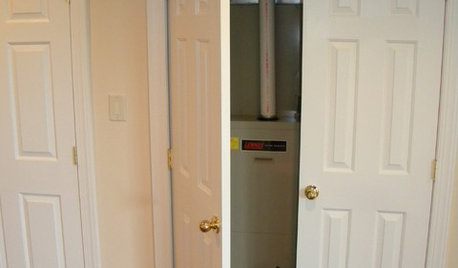Buyer is backing out of signed contract..now what?
R S
6 years ago
Featured Answer
Sort by:Oldest
Comments (77)
Related Discussions
What are the chances of a buyer backing out at the last minute?
Comments (26)This is has got to be one of the best closing stories. Its funny now, but it sure wasn't very funny at the time. After my wife's mother passed away, it was up to us to sell the house. It was a cute little 1920's house that did need some things done, but it was still a nice place. We had what we thought was a good offer from a really strong buyer. He was a college professor that was living in Italy and had just moved to town to take a job at a local college. My wife's father was a teacher, my wife and her brothers all went to this college, and we thought it was so cool another teacher would be living in the house. Like it was destiny or something. Everything went very smoothly, no problems at all. All house inspections went fine, his loan was approved, etc. Then 2 hours (yes TWO HOURS) before closing, our realtor called us and told us the whole thing was cancelled. When the whole story broke it was totally unbelievable. We assumed that this buyer was renting a local house or staying in a hotel. No, not the case.........he and his wife were living in a tent in an abandoned lot. Can you believe that? A tent! His loan was approved based on the fact that he had enough of a downpayment. This downpayment was based upon him selling a classic car that was still located in Italy. The car never sold, therefore no downpayment, therefore the whole deal was off. I think we were more angry with the bank to allow it to get this far than we were with the goofy buyer. Even funnier........even though the sale never went through, this bozo had already changed his mailing address to the property address. We got all of his mail for about 2 weeks afterwards. Goes to show ANYTHING can happen. Cross your fingers and hope everything goes through. Good luck!...See MoreBuyers may be backing out...
Comments (24)The way the inspection report was done for our house was that the inspector wrote the buyer a letter. There was a summery of the house (age, type, location) then he listed a few things, the flue on the new furnace, concrete blocks in the crawl, kitchen sink not being the right trap, electric outlet not ground right. At the end it said a detailed inspection report would follow to the buyer. The buyer sent a letter to my agent saying they wanted numbers such & such to be considered for repair. There really wasn't a lot on our report, I don't doubt our buyer knew they were getting a decent house. Thankfully we only lost two weeks but now we're a three-week old listing vs. a brand-new listing. I also worry we now appear "tainted" that we had a deal fall through. It's frustrating since we feel we've been so honest about the roof and very fair in our pricing. I don't think I'd worry about being "tainted". It's a weird market, people are backing out all of the time. Look at the news, real estate is not looking good. Buyers get scared. You're very lucky to have gotten an offer so quick. We were on for 9 months, then a 60 day close which I would never recommend. If you do get a contract, insist on a 30 day close if you can. I wrote a polite email to the buyer directly to ask if the roof was really the only reason he had decided not to go forward with the contract. I probably should not have, and I didn't exactly expect a response, but couldn't help myself from asking without the game of telephone through agents. He never responded. I do wonder how this ended so badly. It seemed hostile when he told our agent he wouldn't share his inspection report because he himself had paid for it, yet said he was going to make a lower offer based on his report. How could we even consider to accept that without privy to the inspection report? Now my husband and I are worried are there other things wrong with the house. Our realtor was at the inspection and he keeps reassuring us there really isn't, that these buyers are using a roof they knew about to get out of the deal. Who knows why buyers back out? We had one back out during attorney review, never got to the inspection stage. FWIW, the buyer doesn't have to share the report with you, and if they did, you might have to fix what you know about or disclose it. Could be anything from the school system to a registered sex offender that you don't know about. It could also be that buying a house was too stressful for them as a couple. Maybe they work pretty far from the house, with gas going up they changed their minds. Could be anything, but apparently they used the report to get out of it....See MoreDo I have the right to the deposit when buyer backed out
Comments (8)Why would the money be listed on the Comptroller's page? In my current state, annually the Comptroller publishes a list of un-claimed monies. California is on of those states that does not have a sit-down closing with lawyers. Every Comptroller List of Un-Claimed property has listed the value, the name and last known address, and provides specific contact info. I would contact the Controller's Office per those instructions, if it is on the current list that certainly implies (to me, anyway) that the statute of limitations has not been reached....See MoreCan builder sign with another buyer if I'm still under contract
Comments (27)if the plan was for 2,000 square feet and the final was 1,500 square feet, I would imagine the OP would have an easy time getting the remaining deposit back, even though they signed off already. I respectfully disagree. It is exceedingly unlikely that the OP could overcome the settlement and even more unlikely that it would make financial sense to try. We should understand that in most states you risk more than your deposit when you breach a contract. The deposit is given as reasonable insurance you will not breach, but it is rare that any contract maker will limit their recourse to surrender of deposited funds. The builder could sue for specific performance, in other words he could make you buy it. He might also sue for losses associated with your breach. When you agree to a partial refund, you are agreeing that you will not sue him for problems during construction and he will not sue you for further damages or specific performance. A settlement is essentially a new contract. The only way the OP would reasonably get around that, and still probably not cheaply, is if he could prove that the builder regularly did this as a profit generator. I once saw a landlord, who had low rent rates on a great property, get in trouble for taking excessive applications, and associated fees, for each apartment he rented. Whenever he needed money he would just accept applications even if he didn't have a vacancy, at $75 per application he was making a mint off of them and he would just put people on a waiting list, sometimes for years. He lost a case and ended up having to sell the complex....See MoreDebbie Downer
6 years agoncrealestateguy
6 years agoJmc101
6 years agobry911
6 years agoHockeymom84
6 years agoncrealestateguy
6 years agoUser
6 years agolast modified: 6 years agoncrealestateguy
6 years agoUser
6 years agolast modified: 6 years agobry911
6 years agolast modified: 6 years agoStan B
6 years agolast modified: 6 years agoUser
6 years agoDenita
6 years agoncrealestateguy
6 years agodbrad
6 years agoDenita
6 years agolast modified: 6 years agobry911
6 years agolast modified: 6 years agoUser
6 years agoDenita
6 years agolast modified: 6 years agoUser
6 years agolast modified: 6 years agobry911
6 years agoUser
6 years agolast modified: 6 years agoncrealestateguy
6 years agoUser
6 years agoParadise Alcove LLC
6 years agolast modified: 6 years agobry911
6 years agobry911
6 years agolast modified: 6 years agoDenita
6 years agoUser
6 years agolast modified: 6 years agobry911
6 years agolast modified: 6 years agoHockeymom84
6 years agodbrad
6 years agoDenita
6 years agohomechef59
6 years agoUser
6 years agochicagoans
6 years agolast modified: 6 years agoncrealestateguy
6 years agonosoccermom
6 years agolast modified: 6 years agokenjwy
6 years agolast modified: 6 years agoUser
6 years agolast modified: 6 years agokenjwy
6 years agolast modified: 6 years agoUser
6 years agonosoccermom
6 years agolast modified: 6 years agoDenita
6 years agobry911
6 years agocpartist
6 years ago
Related Stories

KITCHEN BACKSPLASHESTrending Now: Color and Pattern Make These Backsplashes Stand Out
Jazz up a white kitchen or enhance a dark wood one with a bold backsplash. These 10 trending kitchen photos offer ideas
Full Story
FURNITUREForever Furniture: A Buyer’s Guide to the Dining Table
There comes a time when a make-do piece of furniture won’t do. We give you a leg up on choosing the right table for you
Full Story
KITCHEN DESIGNA Buyer’s Guide to Kitchen Counter Stools and Bar Stools
Before shopping for counter or bar stools, read our guide to stool heights, styles, spacing and comfort considerations
Full Story
MOST POPULARA First-Time Buyer’s Guide to Home Maintenance
Take care of these tasks to avoid major home hassles, inefficiencies or unsightliness down the road
Full Story
BEDROOMSA Buyer’s Guide to Covers for Cozy Winter Nights
Know what to look for when shopping for wool, fleece, cotton, acrylic and electric blankets, as well as quilts
Full Story
WINDOW TREATMENTS6 Ways to Deal With a Bad View Out the Window
You can come out from behind the closed curtains now. These strategies let in the light while blocking the ugly
Full Story
BEFORE AND AFTERSReinvent It: Street Signs Become a Lively Kitchen Backsplash
City surplus as unique decor? A Seattle family said sure, and now it's the star of their remodeled kitchen
Full Story
LIFEYour Back-to-School Game Plan
Set up a few systems now for an easy and organized routine when school starts
Full Story
GARDENING AND LANDSCAPINGBudget Decorator: 10 Ways to Deck Out Your Patio
Hang a vintage sign here and some inexpensive curtains there, for a patio or deck that looks polished and pulled together
Full Story
FLOORSNew Groove: Vinyl Floors Are Back!
First vinyl records made a comeback, now floors. See how, where and when to use this durable, easy-to-clean material
Full StorySponsored
Columbus Design-Build, Kitchen & Bath Remodeling, Historic Renovations





jrb451